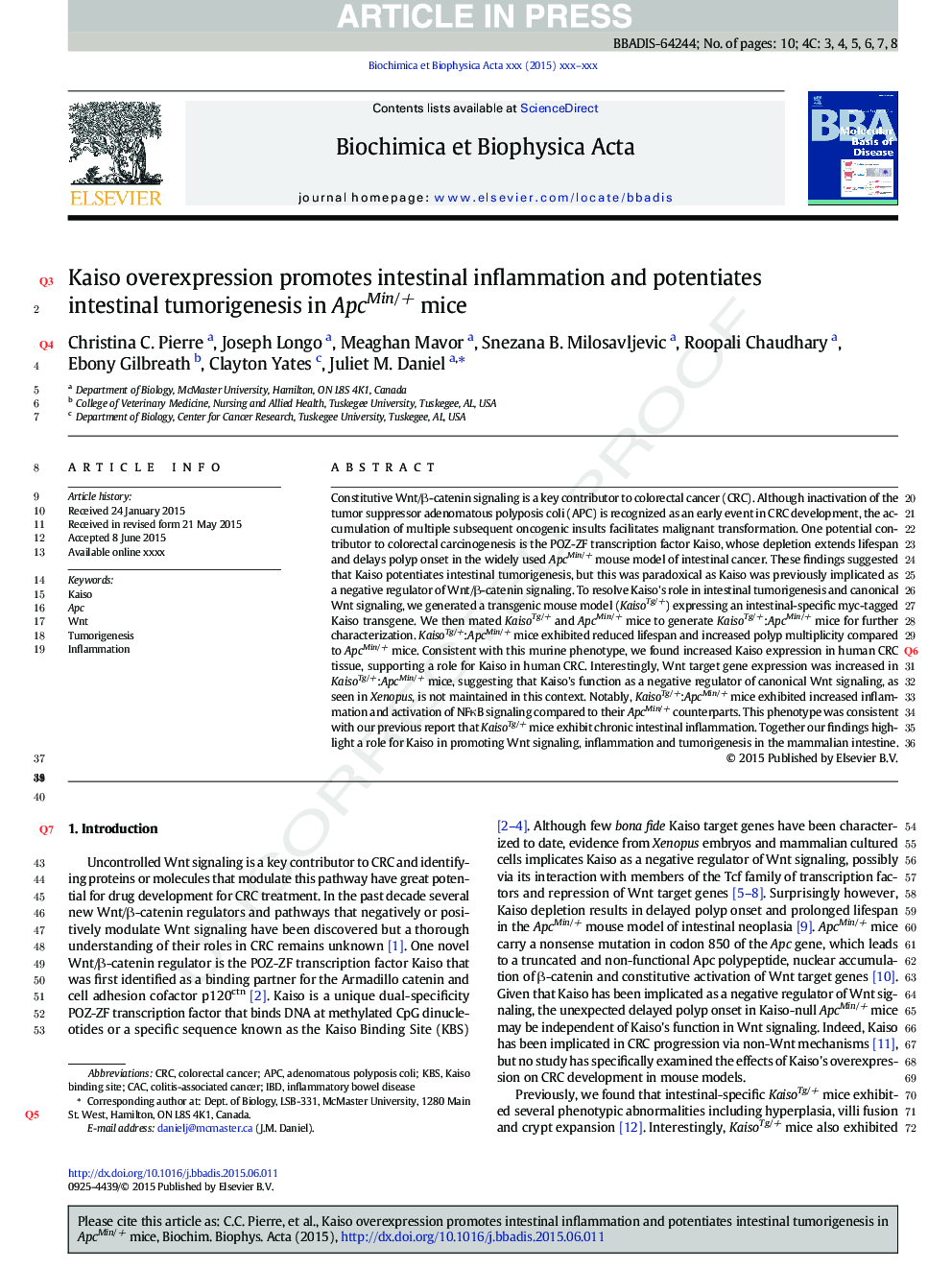| کد مقاله | کد نشریه | سال انتشار | مقاله انگلیسی | نسخه تمام متن |
|---|---|---|---|---|
| 8259705 | 1534643 | 2015 | 10 صفحه PDF | دانلود رایگان |
عنوان انگلیسی مقاله ISI
Kaiso overexpression promotes intestinal inflammation and potentiates intestinal tumorigenesis in ApcMin/+ mice
دانلود مقاله + سفارش ترجمه
دانلود مقاله ISI انگلیسی
رایگان برای ایرانیان
کلمات کلیدی
CACIBDAPCWntKBSadenomatous polyposis coli - آدنوماتوز پولیپوزیس کولی یا آدنوماتوس پولیپوزیس کولای inflammation - التهاب( توروم) Inflammatory bowel disease - بیماریهای التهابی رودهTumorigenesis - تومورزاییColorectal cancer - سرطان روده بزرگcolitis-associated cancer - سرطان مرتبط با کولیتKaiso - کایسوCRC - کد افزونگی دورهای
موضوعات مرتبط
علوم زیستی و بیوفناوری
بیوشیمی، ژنتیک و زیست شناسی مولکولی
سالمندی
پیش نمایش صفحه اول مقاله

چکیده انگلیسی
Constitutive Wnt/β-catenin signaling is a key contributor to colorectal cancer (CRC). Although inactivation of the tumor suppressor adenomatous polyposis coli (APC) is recognized as an early event in CRC development, it is the accumulation of multiple subsequent oncogenic insults facilitates malignant transformation. One potential contributor to colorectal carcinogenesis is the POZ-ZF transcription factor Kaiso, whose depletion extends lifespan and delays polyp onset in the widely used ApcMin/+ mouse model of intestinal cancer. These findings suggested that Kaiso potentiates intestinal tumorigenesis, but this was paradoxical as Kaiso was previously implicated as a negative regulator of Wnt/β-catenin signaling. To resolve Kaiso's role in intestinal tumorigenesis and canonical Wnt signaling, we generated a transgenic mouse model (KaisoTg/+) expressing an intestinal-specific myc-tagged Kaiso transgene. We then mated KaisoTg/+ and ApcMin/+ mice to generate KaisoTg/+:ApcMin/+ mice for further characterization. KaisoTg/+:ApcMin/+ mice exhibited reduced lifespan and increased polyp multiplicity compared to ApcMin/+ mice. Consistent with this murine phenotype, we found increased Kaiso expression in human CRC tissue, supporting a role for Kaiso in human CRC. Interestingly, Wnt target gene expression was increased in KaisoTg/+:ApcMin/+ mice, suggesting that Kaiso's function as a negative regulator of canonical Wnt signaling, as seen in Xenopus, is not maintained in this context. Notably, KaisoTg/+:ApcMin/+ mice exhibited increased inflammation and activation of NFκB signaling compared to their ApcMin/+ counterparts. This phenotype was consistent with our previous report that KaisoTg/+ mice exhibit chronic intestinal inflammation. Together our findings highlight a role for Kaiso in promoting Wnt signaling, inflammation and tumorigenesis in the mammalian intestine.
ناشر
Database: Elsevier - ScienceDirect (ساینس دایرکت)
Journal: Biochimica et Biophysica Acta (BBA) - Molecular Basis of Disease - Volume 1852, Issue 9, September 2015, Pages 1846-1855
Journal: Biochimica et Biophysica Acta (BBA) - Molecular Basis of Disease - Volume 1852, Issue 9, September 2015, Pages 1846-1855
نویسندگان
Christina C. Pierre, Joseph Longo, Meaghan Mavor, Snezana B. Milosavljevic, Roopali Chaudhary, Ebony Gilbreath, Clayton Yates, Juliet M. Daniel,